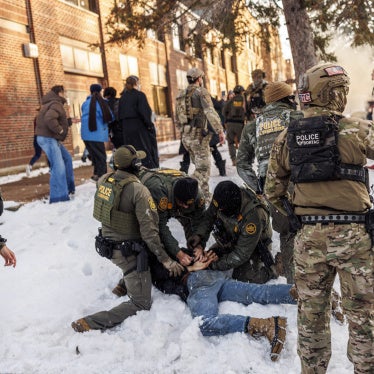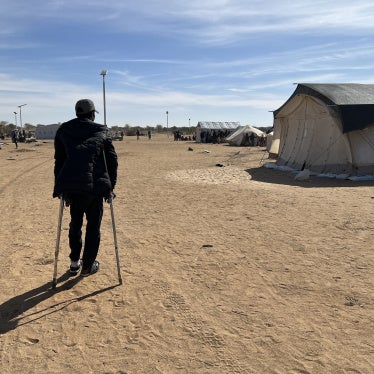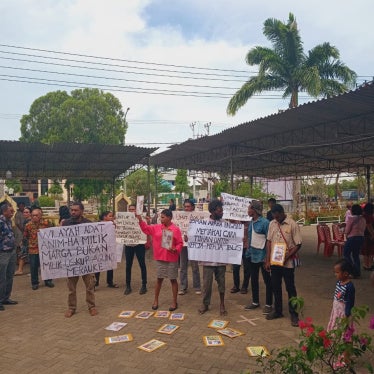Senator Danforth approached his mission by proposing four tests for the two main parties to the conflict in Sudan to prove their commitment to a peace process:
1) The signing of a ceasefire agreement for the conflict in the Nuba Mountains, allowing humanitarian access, to be monitored by a team of fifteen to twenty-five international personnel;
2) An agreement by both sides not to attack or target civilians or civilian objects in the war in the south, also to be monitored, by a verification mission of fifteen international professional staff;
3) The appointment of a commission consisting of eminent persons from many countries, which will investigate and make recommendations for practical solutions to the problem of slavery in Sudan; and
4) Respect for “zones of tranquility” in the conflict areas, enabling humanitarian agencies to carry out polio vaccinations and campaigns against rinderpest and guinea worm.
Senator Danforth visited Sudan most recently in January 2002. His work as special envoy and the imposition of the four tests, initially received with skepticism, have produced some positive results for the promotion of human rights and the prospects for peace in Sudan. By late March 2002, both the government of Sudan and the SPLA had agreed to the four points. In particular, the Nuba Mountains ceasefire agreement was signed by both parties January 19, 2002, in Switzerland, and the agreement not to attack or target civilians or civilian objects was signed March 10 by the government and March 25 by the SPLA. However, the four points have not yet been fully implemented.
1. Nuba Mountains humanitarian ceasefire agreement.
The Nuba Mountains, in the center of Sudan and not geographically contiguous with the south or other areas of rebel activity, is an area contested only between government and SPLA forces. The Danforth report correctly notes that until very recently the Nuba Mountains “had been under siege for almost two decades by the Government, which used military force and starvation as
weapons, and which applied cultural and religious pressures against the people who live there. The government had allowed no relief into certain targeted areas of the Nuba Mountains for thirteen years to reinforce food pressures upon the population.”
The ceasefire agreement contains significant human rights provisions: article 3 (d) says it forbids "all acts of violence against or other abuse of the civilian population" and then provides a long list of actions that would qualify as abuse.
In the context of Senator Danforth’s efforts, even before the ceasefire agreement was signed, the government allowed the delivery of international aid to the Nuba Mountains in late 2001 for the first time since the war came to the area in 1986. The January 2002 ceasefire agreement provides for free movement to and from the SPLA-controlled areas of the Nuba Mountains, and for civilians to return to the land from which the army expelled them. There are twelve monitors currently in place, military observers from the U.S. and Europe operating under the command of a Norwegian general. They report to a Joint Military Commission (JMC) created under the Nuba Mountains ceasefire agreement. The JMC consists of three representatives from each party and three neutrals appointed by participating countries in consultation with the parties; the neutrals are to be chair and two vice chairs of the JMC. The ceasefire is holding, although both sides have complained of some violations.
The Danforth report states that the aim of U.S. policy should be to move the parties in the Nuba Mountains (government and SPLA) toward a comprehensive ceasefire and toward developing “their confidence in working with each other and us in a practical, nonpolitical manner.”
One impediment to achieving this aim will be that, at this moment, there is no clearly designated person or institution in the Nuba Mountains responsible for receiving complaints from the civilian population and organizations, investigating them, and taking steps to address them. There are at least ten human rights monitors who have been operating independently on the SPLA side of the Nuba Mountains, documenting government abuses, since 1995, trained and assisted by the London-based human rights organization Justice Africa. There has been no coordination with or outreach to this organization or these monitors, whose reporting skills and background knowledge would be invaluable to the Joint Military Commission.
2. Agreement not to target civilians or civilian objects in the war in the south
If observed, this agreement will mark a significant step forward in ensuring respect for human rights and international humanitarian law in Sudan. Neither the government nor the SPLA have previously agreed in writing to refrain from targeting civilians and civilian objects, nor have they permitted the deployment of international (or national) monitors. Senator Danforth’s report indicates that negotiations on this point took months, and that “we encountered stiff resistance to our proposal to end intentional military attacks against civilians…”
As the Danforth report notes, the verification mechanism is not yet in place. The U.S. has undertaken the responsibility for pulling it together and “taking the lead in providing both financial and personnel support to ensure success.” It is intended that fifteen experienced professionals will staff the mechanism, which will be headquartered in Khartoum (at government insistence) with a secondary office in Rumbek. This is not ideal: Khartoum is hundreds of kilometers from the south and from any fighting. Rumbek, the SPLA headquarters, is in Bahr El Ghazal, is not a central location for relief personnel or operations, and is subject to arbitrary government flight bans of U.N. and nongovernmental planes serving the relief scheme. The agreement is clear, however, that the verification team is entitled to have access anywhere it wants—though, because of the immense size of southern Sudan, it is unlikely that fifteen professionals will be adequate to cover the area and investigate all claims of breach of the agreement.
Senator Danforth notes that the upsurge in oil production in 1999 has reshaped Sudan's civil war and that the government apparently sees the recent reconciliation of two factions of the SPLA as a serious threat to the oil fields. Accordingly, the government bargained hard to specifically include oil installations as “civilian objects” which the SPLA could not target under the agreement. The SPLA bargained also to specifically exclude oil installations as “civilian objects.” The negotiators achieved agreement by the parties that the language would remain silent on this point and that the monitors would make a determination on a case-by-case basis. However, in the event that oil installations are targeted, this will be a controversial point, and the
U.S. and other interested parties should plan a response calculated to keep the government engaged should the monitors decide an oil installation is not a civilian object in a particular case.
Despite this agreement, several recent reports state that the situation in Western Upper Nile, one part of southern Sudan affected by the civil war, is extremely desperate for civilians, who are being forcibly displaced from their homes and grazing areas by Baggara Arab militiamen on horseback, armed by the government, and by government helicopter gunships and troops. Many of these people already have been displaced once or more. The raiders on horseback have used a bridge built by an oil company at Bentiu to cross into territory previously protected from their raids by a deep river, to attack people who years ago fled over the river for safety. A recent report by Medecins Sans Frontieres points out the health consequences of war to Western Upper Nile alone, where more than 100,000 people died of kala azar, a parasitic disease, that was untreated because of the war and denial of access.
3. Anti-slavery initiative:
The Sudan government and the SPLA have agreed to the establishment of a commission to look into the issue of slavery (or abduction and forced labor, as the government calls it), which is to investigate the problem and make practical recommendations to address it. The commission consists of a panel of eight “eminent persons” designated by the governments participating in the investigation: two from the U.S., two from the U.K., one from Italy, two from Norway, and one from France. The eight commissioners are joined by a technical team of four experienced researchers: two U.S. citizens, one U.K. citizen, and one Canadian. The commission plans to visit the region twice for ten days each, in April and May 2002, and to report findings and recommendations at the end of May.
In addition, the Danforth report states that U.S. AID and the State Department are making funds available to promote reconciliation between the Dinka (who have been raided for slaves) and the “marauding raiders” (the Baggara). It is essential that any disbursement of funds along these lines be controlled and coordinated by a long-term monitoring body, to ensure in particular that no funds can reach the perpetrators of abuses.
See also http://www.hrw.org/backgrounder/africa/sudanupdate.htm
4. Days of tranquility
Implementation of obviously beneficial medical campaigns—to combat polio, guinea worm, and bovine rinderpest—has been much more difficult than the Danforth mission anticipated. The Danforth report states that there has been great confusion over these three programs and over where the responsibility lies for delays. The report also notes that the Sudan government “tries to manipulate the process to tighten control of supplies going to SPLM areas,” and that the SPLA often has demanded that U.N. flights neither originate in nor fly over government-controlled territory. In the past, the government has frequently imposed bans on access by U.N. relief planes to any area it wishes, without explanation.
This confusion over responsibility may be due in part to the fact that the agreement calls for limited access: to specific but different areas during specified but different times to implement three different programs. What is needed, rather, is an agreement for full and unimpeded humanitarian access to all areas and for all programs. Both parties should agree that they will
permit relief flights and other deliveries and will advise the humanitarian relief agencies in a timely manner if they consider any area unsafe for relief operations. The U.N. humanitarian security staff may then make its own assessment, and the relief operations should be undertaken on its sole authority, without further need for government or other clearance. In the meantime, a firm deadline for compliance with the existing agreement should be imposed and penalties attached to a party's failure to meet the deadline.








